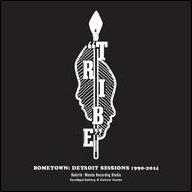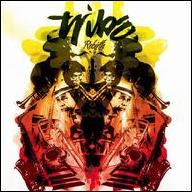The label showcased stylistic diversity as a core quality. Tribe's first release, 1973's Message from the Tribe, ranged from galloping jazz-funk to avant-jazz. A year later, 1974's Voices Rhythms of the Creative Profile bridged gospel, soul-jazz, expansive African-centered choral music, and funk. Gemini II (also 1974) wed early Afro-futurism and post-bop while 1975's Reflections in the Sea of the Nurnen wove avant soul-jazz and spoken word. New Message from the Tribe, from pianist/composer Pam Samiha Wise in 2017, bound tight, post-Mingus-esque post-bop arrangements to Afro-Latin and funk grooves.
Harrison is a Detroit native. His musical prowess took him from the city's illustrious music program at Northwestern High School to New York City during the '60s, where he played with Jack McDuff, Elvin Jones, Sonny Stitt, Grant Green, and Sun Ra. Before returning to the Motor City, he had spent four years with Hank Crawford's band. Ranelin was originally from Indianapolis, Indiana. He moved to Detroit in 1961 in order to do session work for Motown. Belgrave, a veteran of bands led by Ray Charles, Mingus, and Max Roach, came soon after. All were equally comfortable playing everything from bop and post-bop to free jazz and funk. The idea was to form a band first, which they did with McKinney, from Detroit's first family of jazz. Their debut album, 1973's Message from the Tribe, also included pianist Charles Eubanks, trumpeter Charles Moore, bassist Will Austin, and drummer/percussionist Ike Daney. While the album was well-received in Detroit and created many reverberations across its arts scene, the small independent distribution system kept it from making national waves. Later that year, under Harrison's name, An Evening with the Devil (titled for his three-part suite on Message from the Tribe) appeared and received very favorable reviews from as far away as Chicago and New York. Its two most significant tunes were the provocative and politically astute "Mary Had an Abortion" and its closer, "Rebirth" -- whose title was chosen as the namesake for Harrison's late-'70s arts organization -- showcased the group's philosophical aesthetic and political views. After establishing themselves in live venues across the Detroit area, Tribe began publishing its magazine; designed by artist Patricia Harrison, a Tribe co-founder, it became a clearinghouse for cultural information across the African-American community and a consciousness-raising tool. Belgrave's Afro-futurist jazz-funk outing Gemini II appeared in 1974, as did Ranelin's The Time Is Now and Harold McKinney's expansive, soul-jazz fusion offering Voices Rhythms of the Creative Profile.
In 1975, the album Reflections in the Sea of the Nurnen by Hammond and Durrah was released; it has since become an out jazz classic. Ranelin's 1976 offering Vibes from the Tribe featured a plethora of musicians from across Detroit's jazz community and organizations including pianist Kenny Cox (Strata), guitarist Ron English, bassist Ralphe Armstrong, drummers/percussionists George Davidson and Bud Spangler, and saxophonist Faruq Z. Bey (Griot Galaxy). While Tribe Records issued a host of singles throughout 1975 and 1976, the label's final album was by another Detroit ensemble altogether: The Mixed Bag's First Album came from a funky fusion sextet of Detroiters who included bassist Ron Brooks, reedist Larry Nozero, drummer Dan Spencer, guitarist Jerry Glassel, keyboardist Gaff Dunsun, and percussionist Dave Koether. (The album also featured a liner essay by pianist Bob James.)
In late 1977, the collective split amicably and remained close friends and collaborators. Harrison and McKinney formed Rebirth Inc. Aided by John Sinclair, they formed a link with public radio station WDET and began an outreach program to teach children music and publish Harrison's jazz instruction books. The saxophonist continues to record extensively as a leader with his own labels, WenHa and Tribe, that document Rebirth and the post-Tribe collective recording sessions helmed by Ranelin, McKinney, Belgrave, Pamela Wise, and others. Ranelin joined Freddie Hubbard's band for several years, moved to Los Angeles, and played on the Red Hot Chili Peppers' self-titled debut. He resumed his career as a bandleader with his unit Lifeforce and eventually joined the L.A. collective Build an Ark, co-led by Carlos Nino and Miguel Atwood-Ferguson.
In their aftermath, Tribe's various recordings developed a reputation among DJs, producers, and record collectors for their musical openness, groove consciousness, and sophistication; they became sought-after collector's items. In 1996, the U.K. label Soul Jazz Records' imprint Universal Sound issued the compilation Message from the Tribe: An Anthology of Tribe Records 1972-1976. In addition to selections from the label and group's catalogs, it came with a 52-page booklet containing articles & features taken from The Tribe magazine.
In 2002, electronic music producer Carl Craig worked with Belgrave on a cover of the Tribe's "Space Odyssey" for his Detroit Experiment recording. In the aftermath, Craig and Belgrave reunited Ranelin, Harrison, and Hammond (McKinney had passed on in 2001 though he had recorded with Ranelin and Belgrave after the split), to produce the Tribe album Rebirth. Recorded and issued digitally in 2004, it eventually received a physical release in 2009. The band played shows together, including a victorious stint at the Detroit Jazz Festival. Belgrave passed away in 2015. In 2017, Pam Samiha Wise's New Message from the Tribe deliberately employed the spirit of adventure and community the original group had birthed in Detroit witha younger group of players--it was produced by Harrison. In 2019, the U.K.'s Strut label released Hometown: Detroit Sessions 1990-2014, compiling sessions recorded at Rebirth and the SereNgeti Gallery and Cultural Center. The tunes were composed and led alternately by Ranelin, McKinney, and Wise, with the original quartet and a wide selection of guests including Armstrong, drummer Gayelynn McKinney, percussionist Francisco Ali Mora, and bassist Reggie Workman, to name a few. ~ Thom Jurek, Rovi













